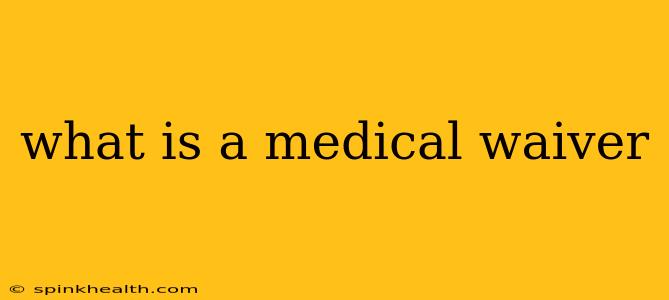What is a Medical Waiver? A Journey Through the World of Exemptions
Imagine this: you're eager to join the army, but a slight heart murmur prevents you from meeting the standard physical requirements. Or perhaps you're applying for a physically demanding job, and a past injury raises concerns about your ability to handle the workload. In both scenarios, a medical waiver could be your key to unlocking opportunities otherwise unavailable.
A medical waiver is, simply put, a document that allows an individual to bypass or override certain medical standards or requirements typically needed for a specific purpose. It's essentially an official exemption, acknowledging a pre-existing condition or medical history that might normally disqualify someone, but stating that, despite the condition, the individual is deemed fit enough for the opportunity at hand.
Think of it as a carefully considered exception, granting permission to proceed where strict adherence to standard medical guidelines would otherwise present a barrier. The process is rigorous and involves detailed medical evaluations, often requiring consultation with specialists and extensive documentation.
What Types of Situations Require Medical Waivers?
The need for a medical waiver varies considerably depending on the context. Let's explore some common examples:
1. Military Service: Military branches have stringent physical standards to ensure recruits can handle the rigors of training and combat. Minor medical issues, such as mild asthma, correctable vision problems, or past injuries, might initially disqualify candidates. A medical waiver, however, might allow individuals to overcome these obstacles if their overall health is deemed satisfactory and their condition is manageable.
2. Employment: Certain jobs, particularly those involving physical exertion or exposure to hazardous environments, mandate specific physical capabilities. A pre-existing condition or medical history might raise concerns about an applicant's ability to perform their duties. A medical waiver, backed by thorough medical assessment, confirms the candidate's fitness for the position, acknowledging their condition but verifying their capability to succeed.
3. Insurance: While not always called a "medical waiver," some insurance policies might require additional assessments or documentation to cover pre-existing conditions. This often involves proving the condition is managed effectively, minimizing the risk for the insurance company. The process, while not explicitly a waiver, serves a similar function, allowing coverage despite the pre-existing condition.
4. Sports and Fitness: In competitive sports, specific medical standards might exist. An athlete with a past injury or underlying medical condition might need a waiver to participate, confirming their fitness level is sufficient to safely compete. This is particularly important in contact sports or those demanding high levels of physical fitness.
How is a Medical Waiver Granted?
The process for obtaining a medical waiver is not standardized across all contexts. It often involves:
- Thorough Medical Examination: Extensive medical tests, specialist consultations, and detailed reviews of medical records are common.
- Documentation Review: All relevant medical documentation, including previous treatment records and reports, will be thoroughly reviewed to understand the nature, severity, and management of the condition.
- Risk Assessment: A risk assessment will be conducted to determine whether the condition poses a significant risk to the individual or others.
- Review by a Medical Board: Often a board of medical professionals reviews the case and makes a decision on whether to grant the waiver.
What are the Common Reasons for Denial of a Medical Waiver?
While waivers are possible, they're not guaranteed. The following situations often result in waiver denial:
- Severe or Unmanaged Conditions: Conditions that significantly impair function and pose substantial risks are usually cause for denial.
- Insufficient Documentation: Lack of comprehensive medical documentation makes evaluation challenging and may lead to denial.
- High Risk of Recurrence or Exacerbation: If the condition has a high likelihood of recurring or worsening, the waiver might be denied.
Obtaining a medical waiver is a complex process that requires patience and thorough cooperation with medical professionals. It's a journey requiring detailed documentation, careful evaluations, and a comprehensive understanding of the specific requirements related to the situation at hand. Each case is unique, and the outcome depends on the individual's specific circumstances and the thoroughness of their medical evaluations.

